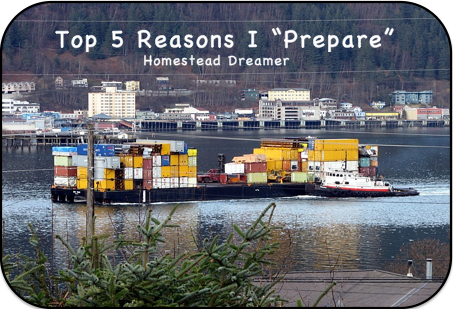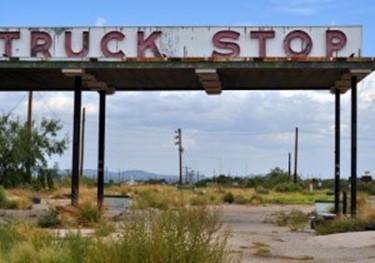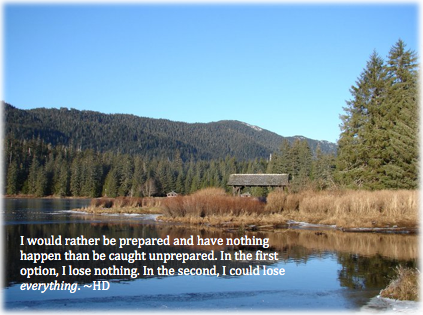I was about to write something like this when friends at homesteaddreamer hit it right on the head.
This is the orginal post below, but stop over at homesteaddreamer for much more information on “Working toward a more self sufficient life”.
Picture by David Kent, © 2006
Hollywood has turned the word “prepper” into a laughable term that conjures up images of some whack job in a bunker with gas masks. The reality of it could not be further from the truth. As with anything, there are the extremists out there who take things over the top. The current fad is to capitalize on those types to entertain the masses (“Doomsday Preppers” anyone?). Anyone who knows me or has followed me for more than a month, already knows I am not anything like what is portrayed on television. The Mister and I consider it “self-regulated insurance.” Some are taken back when they hear me say I consider myself a morphed version of a homesteader and a prepper (most do not understand that they are one in the same for the most part). I generally just tell people that I am turning into my grandma (which is true) and they accept it as something more palatable, more ‘normal.’ For those rare people who are not put off by the word prepper or think I am crazy to think in these terms of being ready for some unforeseen event, I tell them my top 5 reasons the husband and I have gone over to this more self reliant lifestyle. They are given in order of importance;
1. Loss of job. Any one can lose their job at any time. Most people reading this (myself included) simply do not have the means to be able to put back 3 months of bills into a savings account. They live by the seat of their pants – paycheck to paycheck. Having supplies such as an extra 20# bag of rice (bought on sale!) or pack of toilet paper will make getting through a job loss easier in many ways. There is a comfort knowing that even if you do not have money coming in, you have some food set back that will not go bad anytime soon. You will still be able to feed your family and keep clean while you figure out the rest. I can personally attest to this – when I was finishing college I was not working and our budget was so tight that a vice grip would be jealous. I had the pantry filled with extras like rice, beans, flour, sugar, etc. and other staples. The freezer was pretty full because of a meat sale I was able to take advantage of and we made it through. All actual money we had went to rent and bills and we ate the stores I had set back. I learned some great new recipes, too!
2. Break in the Supply Chain. Living on an island means everything is shipped in by barge, ferry, or plane. We rely completely upon these ‘just in time’ systems for absolutely everything. Should some catastrophe happen in the ‘lower 48,’ our supplies here would surely be affected. A large earthquake or storm system could slow or even stop supplies moving across the country. The likelihood of supplies actually making it here when the places they are being shipped through also need the same supplies is small – maybe even non existent – until regular lines are restored. Any government aid would also be very slow in making it here, if at all. Should the supply chain become interrupted, people in Southeast Alaska would be on their own in more than one way.
3. Natural Disasters. Thankfully, the area I live in does not have many natural disasters, or even disaster threats. Wildfires and floods or mudslides simply do not happen often here. We have some good storms in Autumn and Spring with sustained winds over 5o MPH and gusts in the 80 MPH range. We are used to these and do not have to worry much about damage to homes or infrastructure. The natural disasters I worry most about would be earthquakes and the tsunamis that follow. We are surrounded by little islands on all sides that would break up some of the tsunami waves however, the initial ‘draining’ of the sea and then it rushing back in would cause significant damage by itself. We are a coastal fishing town – such an event could wipe out salmon stocks if the tsunami hit during spawning season. Fishing boats would be damaged and sink from banging around in the docks or from a rock on the sea floor as the waves rushed out, then back in. We may not see an actual tsunami hit the island I live on, but there would be a ripple effect felt across the region.
4. Economic Collapse. No two ways about it, our country is in trouble financially speaking. Anyone who knows anything of how economics works can see the truth of it. I have great concerns about how it will all shake out in the end and we are consciously working on getting ourselves completely out of debt. That being said, I put this lower on my list because there really is not much I can do about it other than what I already am. If there was indeed an economic collapse, many people think that they simply will not have to pay bills and that is just unrealistic. The rent man and bank will still want their money for the roof over your head and if you don’t have it, you may find yourself out in the cold. Having stuff set back to eat, drink, keep warm with, and keep hygiene up with help immensely as you will not have to buy these things and what funds you do have can be put toward keeping the roof over your head.
5. All the ‘Other Stuff’. Yup, I worry about EMPs or solar flares wiping out the grid. I worry about asteroids smacking the Earth. I worry about terrorists, dirty bombs, chemical warfare, etc. The fact is, ALL of these are possible but that does not mean I am sitting there hiding in my little cocoon waiting for it all to go down. I do what I can to prepare; having the supplies and SKILLS to not only make it, but to also thrive afterward. The skills can actually be very fun to try out. For example; camping is a wonderful activity to help teach yourself and your family how to deal without running water, electricity, and wood heat. Do you know how to start a fire with damp wood? How about putting up a tarp that you can take down without leaving any rope in the trees? Can you identify edible plants in your area? All of these simple activities add up to a lot of powerful knowledge that can literally save you if needed but you learned them by ‘playing’ in the woods. It is all about perspective!
Here is a wonderful little interactive PDF you can use to help get started by breaking things down into manageable chunks. Not sure what scenario to use? I recommend people plan for a job loss first to get used to the form and then go from there. I hope this helps some of the nay-sayers see that being ‘prepared’ is a really smart idea (your grandparents called it ‘normal’) and not just for the whack jobs who are convinced that the whole world is only one event away from total annihilation.
Start now to make sure you are staying prepared.
Via: homesteaddreamer







 Follow
Follow
Leave a Reply